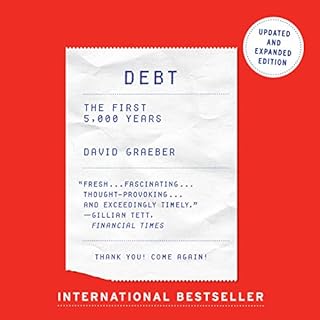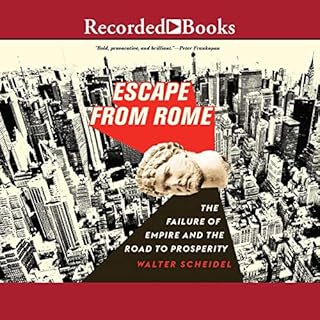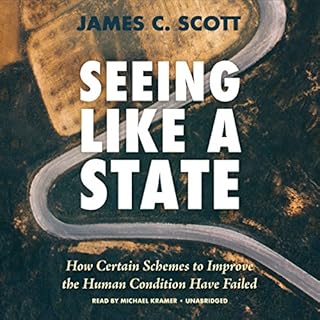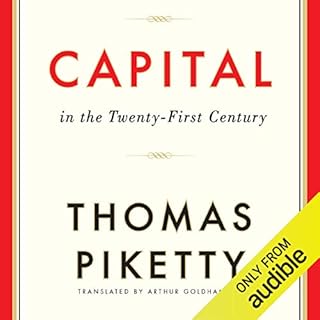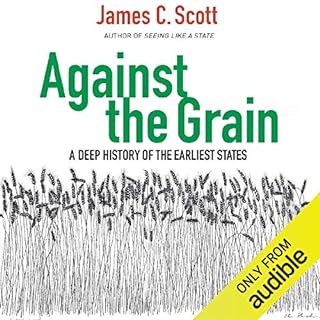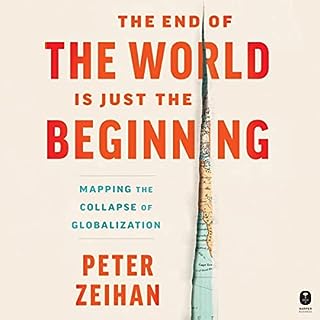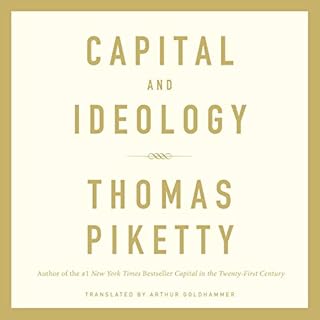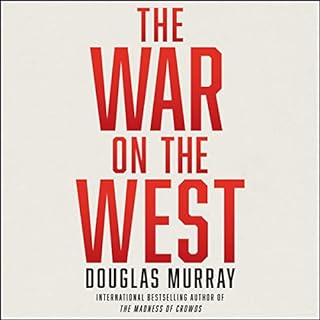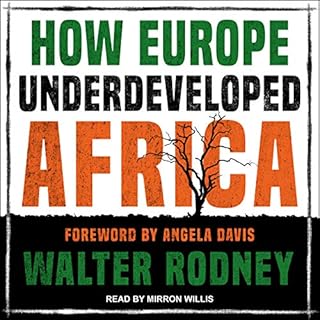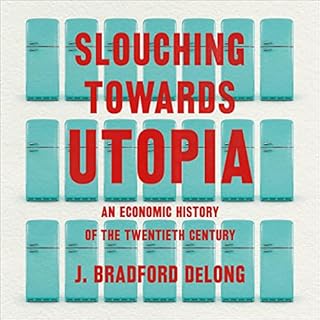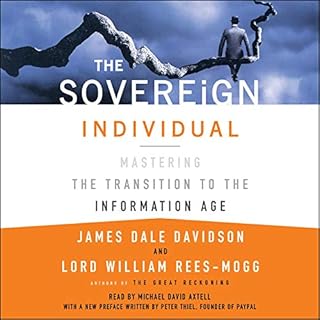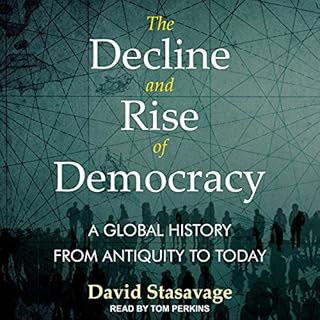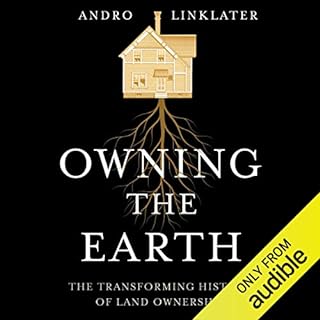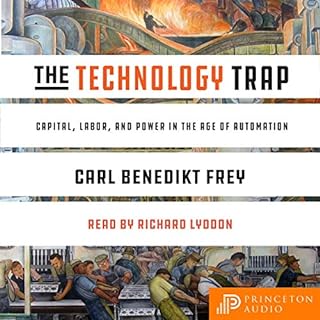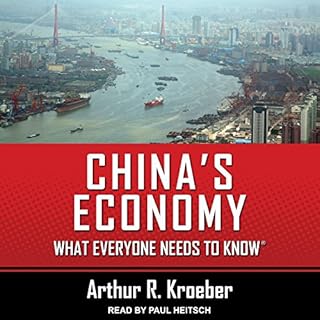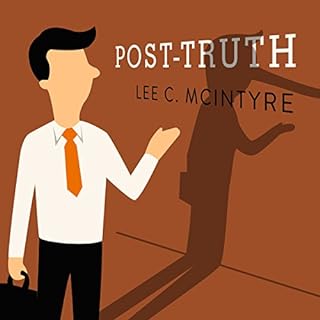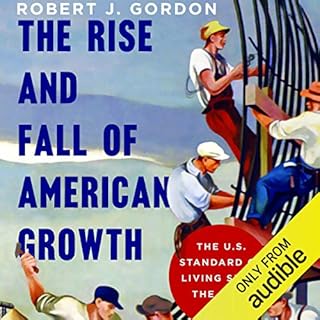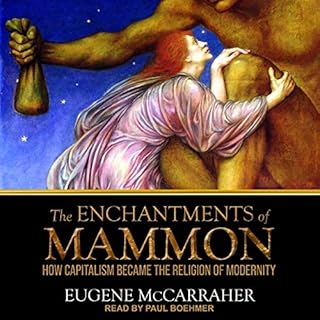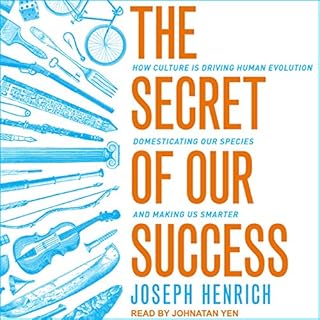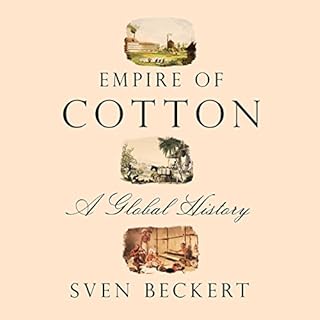
The Great Leveler
Violence and the History of Inequality from the Stone Age to the Twenty-First Century
No se pudo agregar al carrito
Add to Cart failed.
Error al Agregar a Lista de Deseos.
Error al eliminar de la lista de deseos.
Error al añadir a tu biblioteca
Error al seguir el podcast
Error al dejar de seguir el podcast
Compra ahora por $19.77
No default payment method selected.
We are sorry. We are not allowed to sell this product with the selected payment method
-
Narrado por:
-
Joel Richards
-
De:
-
Walter Scheidel
Acerca de esta escucha
Are mass violence and catastrophes the only forces that can seriously decrease economic inequality? To judge by thousands of years of history, the answer is yes. Tracing the global history of inequality from the Stone Age to today, Walter Scheidel shows that inequality never dies peacefully. Inequality declines when carnage and disaster strike and increases when peace and stability return. The Great Leveler is the first book to chart the crucial role of violent shocks in reducing inequality over the full sweep of human history around the world.
Ever since humans began to farm, herd livestock, and pass on their assets to future generations, economic inequality has been a defining feature of civilization. Over thousands of years, only violent events have significantly lessened inequality. The "Four Horsemen" of leveling - mass-mobilization warfare, transformative revolutions, state collapse, and catastrophic plagues - have repeatedly destroyed the fortunes of the rich.
Scheidel identifies and examines these processes, from the crises of the earliest civilizations to the cataclysmic world wars and communist revolutions of the 20th century. Today, the violence that reduced inequality in the past seems to have diminished, and that is a good thing. But it casts serious doubt on the prospects for a more equal future.
©2017 Princeton University Press (P)2017 TantorLos oyentes también disfrutaron...
-
Debt - Updated and Expanded
- The First 5,000 Years
- De: David Graeber
- Narrado por: Grover Gardner
- Duración: 17 h y 48 m
- Versión completa
-
General4.5 out of 5 stars 3,823
-
Narración:4.5 out of 5 stars 3,227
-
Historia4.5 out of 5 stars 3,213
Here, anthropologist David Graeber presents a stunning reversal of conventional wisdom: He shows that before there was money, there was debt. For more than 5,000 years, since the beginnings of the first agrarian empires, humans have used elaborate credit systems to buy and sell goods - that is, long before the invention of coins or cash. It is in this era, Graeber argues, that we also first encounter a society divided into debtors and creditors.
-
5 out of 5 stars
-
Transformative to the point of being revolutionary
- De James C. Samans en 08-14-16
De: David Graeber
-
Escape from Rome
- The Failure of Empire and the Road to Prosperity
- De: Walter Scheidel
- Narrado por: Daniel Henning
- Duración: 21 h y 35 m
- Versión completa
-
General4 out of 5 stars 59
-
Narración:3.5 out of 5 stars 45
-
Historia4.5 out of 5 stars 45
The fall of the Roman Empire has long been considered one of the greatest disasters in history. But in this groundbreaking book, Walter Scheidel argues that Rome's dramatic collapse was actually the best thing that ever happened, clearing the path for Europe's economic rise and the creation of the modern age. Ranging across the entire premodern world, Escape from Rome offers new answers to some of the biggest questions in history: Why did the Roman Empire appear? Why did nothing like it ever return to Europe? And, above all, why did Europeans come to dominate the world?
-
1 out of 5 stars
-
Very interesting book, terrible narration
- De Matt Griffin en 12-03-19
De: Walter Scheidel
-
Seeing Like a State
- De: James C. Scott
- Narrado por: Michael Kramer
- Duración: 16 h y 6 m
- Versión completa
-
General4.5 out of 5 stars 475
-
Narración:4.5 out of 5 stars 388
-
Historia4.5 out of 5 stars 384
Why do well-intentioned plans for improving the human condition go tragically awry? Author James C. Scott analyzes failed cases of large-scale authoritarian plans in a variety of fields. Centrally managed social plans misfire, Scott argues, when they impose schematic visions that do violence to complex interdependencies that are not - and cannot - be fully understood. Further, the success of designs for social organization depends upon the recognition that local, practical knowledge is as important as formal, epistemic knowledge.
-
3 out of 5 stars
-
Beats a dead horse and then beats it again
- De Nathan Parker en 10-29-20
De: James C. Scott
-
Capital in the Twenty-First Century
- De: Thomas Piketty, Arthur Goldhammer - translator
- Narrado por: L. J. Ganser
- Duración: 24 h y 58 m
- Versión completa
-
General4.5 out of 5 stars 3,558
-
Narración:4.5 out of 5 stars 2,983
-
Historia4.5 out of 5 stars 2,961
What are the grand dynamics that drive the accumulation and distribution of capital? Questions about the long-term evolution of inequality, the concentration of wealth, and the prospects for economic growth lie at the heart of political economy. But satisfactory answers have been hard to find for lack of adequate data and clear guiding theories.
-
5 out of 5 stars
-
The Financial Times' Critique Doesn't Detract
- De Madeleine en 05-22-14
De: Thomas Piketty, y otros
-
Against the Grain
- A Deep History of the Earliest States
- De: James C. Scott
- Narrado por: Eric Jason Martin
- Duración: 8 h y 35 m
- Versión completa
-
General4.5 out of 5 stars 871
-
Narración:4.5 out of 5 stars 725
-
Historia4.5 out of 5 stars 720
Why did humans abandon hunting and gathering for sedentary communities dependent on livestock and cereal grains and governed by precursors of today's states? Most people believe that plant and animal domestication allowed humans, finally, to settle down and form agricultural villages, towns, and states, which made possible civilization, law, public order, and a presumably secure way of living. But archaeological and historical evidence challenges this narrative.
-
4 out of 5 stars
-
World without Women
- De Paul Richards en 04-28-18
De: James C. Scott
-
The End of the World Is Just the Beginning
- Mapping the Collapse of Globalization
- De: Peter Zeihan
- Narrado por: Peter Zeihan
- Duración: 16 h y 44 m
- Versión completa
-
General4.5 out of 5 stars 6,209
-
Narración:5 out of 5 stars 5,333
-
Historia5 out of 5 stars 5,296
For generations, everything has been getting faster, better, and cheaper. Finally, we reached the point that almost anything you could ever want could be sent to your home within days - even hours - of when you decided you wanted it. America made that happen, but now America has lost interest in keeping it going.
-
3 out of 5 stars
-
Everyone dies except Americans
- De preetam en 06-22-22
De: Peter Zeihan
-
Debt - Updated and Expanded
- The First 5,000 Years
- De: David Graeber
- Narrado por: Grover Gardner
- Duración: 17 h y 48 m
- Versión completa
-
General4.5 out of 5 stars 3,823
-
Narración:4.5 out of 5 stars 3,227
-
Historia4.5 out of 5 stars 3,213
Here, anthropologist David Graeber presents a stunning reversal of conventional wisdom: He shows that before there was money, there was debt. For more than 5,000 years, since the beginnings of the first agrarian empires, humans have used elaborate credit systems to buy and sell goods - that is, long before the invention of coins or cash. It is in this era, Graeber argues, that we also first encounter a society divided into debtors and creditors.
-
5 out of 5 stars
-
Transformative to the point of being revolutionary
- De James C. Samans en 08-14-16
De: David Graeber
-
Escape from Rome
- The Failure of Empire and the Road to Prosperity
- De: Walter Scheidel
- Narrado por: Daniel Henning
- Duración: 21 h y 35 m
- Versión completa
-
General4 out of 5 stars 59
-
Narración:3.5 out of 5 stars 45
-
Historia4.5 out of 5 stars 45
The fall of the Roman Empire has long been considered one of the greatest disasters in history. But in this groundbreaking book, Walter Scheidel argues that Rome's dramatic collapse was actually the best thing that ever happened, clearing the path for Europe's economic rise and the creation of the modern age. Ranging across the entire premodern world, Escape from Rome offers new answers to some of the biggest questions in history: Why did the Roman Empire appear? Why did nothing like it ever return to Europe? And, above all, why did Europeans come to dominate the world?
-
1 out of 5 stars
-
Very interesting book, terrible narration
- De Matt Griffin en 12-03-19
De: Walter Scheidel
-
Seeing Like a State
- De: James C. Scott
- Narrado por: Michael Kramer
- Duración: 16 h y 6 m
- Versión completa
-
General4.5 out of 5 stars 475
-
Narración:4.5 out of 5 stars 388
-
Historia4.5 out of 5 stars 384
Why do well-intentioned plans for improving the human condition go tragically awry? Author James C. Scott analyzes failed cases of large-scale authoritarian plans in a variety of fields. Centrally managed social plans misfire, Scott argues, when they impose schematic visions that do violence to complex interdependencies that are not - and cannot - be fully understood. Further, the success of designs for social organization depends upon the recognition that local, practical knowledge is as important as formal, epistemic knowledge.
-
3 out of 5 stars
-
Beats a dead horse and then beats it again
- De Nathan Parker en 10-29-20
De: James C. Scott
-
Capital in the Twenty-First Century
- De: Thomas Piketty, Arthur Goldhammer - translator
- Narrado por: L. J. Ganser
- Duración: 24 h y 58 m
- Versión completa
-
General4.5 out of 5 stars 3,558
-
Narración:4.5 out of 5 stars 2,983
-
Historia4.5 out of 5 stars 2,961
What are the grand dynamics that drive the accumulation and distribution of capital? Questions about the long-term evolution of inequality, the concentration of wealth, and the prospects for economic growth lie at the heart of political economy. But satisfactory answers have been hard to find for lack of adequate data and clear guiding theories.
-
5 out of 5 stars
-
The Financial Times' Critique Doesn't Detract
- De Madeleine en 05-22-14
De: Thomas Piketty, y otros
-
Against the Grain
- A Deep History of the Earliest States
- De: James C. Scott
- Narrado por: Eric Jason Martin
- Duración: 8 h y 35 m
- Versión completa
-
General4.5 out of 5 stars 871
-
Narración:4.5 out of 5 stars 725
-
Historia4.5 out of 5 stars 720
Why did humans abandon hunting and gathering for sedentary communities dependent on livestock and cereal grains and governed by precursors of today's states? Most people believe that plant and animal domestication allowed humans, finally, to settle down and form agricultural villages, towns, and states, which made possible civilization, law, public order, and a presumably secure way of living. But archaeological and historical evidence challenges this narrative.
-
4 out of 5 stars
-
World without Women
- De Paul Richards en 04-28-18
De: James C. Scott
-
The End of the World Is Just the Beginning
- Mapping the Collapse of Globalization
- De: Peter Zeihan
- Narrado por: Peter Zeihan
- Duración: 16 h y 44 m
- Versión completa
-
General4.5 out of 5 stars 6,209
-
Narración:5 out of 5 stars 5,333
-
Historia5 out of 5 stars 5,296
For generations, everything has been getting faster, better, and cheaper. Finally, we reached the point that almost anything you could ever want could be sent to your home within days - even hours - of when you decided you wanted it. America made that happen, but now America has lost interest in keeping it going.
-
3 out of 5 stars
-
Everyone dies except Americans
- De preetam en 06-22-22
De: Peter Zeihan
-
The Thirty Years War
- Europe's Tragedy
- De: Peter H. Wilson
- Narrado por: Matthew Waterson
- Duración: 33 h y 25 m
- Versión completa
-
General4.5 out of 5 stars 153
-
Narración:4.5 out of 5 stars 128
-
Historia4.5 out of 5 stars 128
The Thirty Years War devastated seventeenth-century Europe, killing nearly a quarter of all Germans and laying waste to towns and countryside alike. Peter Wilson offers the first new history in a generation of a horrifying conflict that transformed the map of the modern world.
-
3 out of 5 stars
-
Less caffeine, narrator
- De Jeff Joyner en 02-12-24
De: Peter H. Wilson
-
Capital and Ideology
- De: Thomas Piketty, Arthur Goldhammer - translator
- Narrado por: Rick Adamson
- Duración: 48 h y 57 m
- Versión completa
-
General4.5 out of 5 stars 348
-
Narración:4.5 out of 5 stars 274
-
Historia4.5 out of 5 stars 273
Thomas Piketty’s best-selling Capital in the Twenty-First Century galvanized global debate about inequality. In this audacious follow-up, Piketty challenges us to revolutionize how we think about politics, ideology, and history. He exposes the ideas that have sustained inequality for the past millennium, reveals why the shallow politics of right and left are failing us today, and outlines the structure of a fairer economic system.
-
5 out of 5 stars
-
Big thinking at its finest
- De Amazon Customer en 03-20-20
De: Thomas Piketty, y otros
-
The War on the West
- De: Douglas Murray
- Narrado por: Douglas Murray
- Duración: 12 h y 42 m
- Versión completa
-
General5 out of 5 stars 5,079
-
Narración:5 out of 5 stars 4,522
-
Historia5 out of 5 stars 4,492
In The War on the West, Douglas Murray shows how many well-meaning people have been fooled by hypocritical and inconsistent anti-West rhetoric. After all, if we must discard the ideas of Kant, Hume, and Mill for their opinions on race, shouldn’t we discard Marx, whose work is peppered with racial slurs and anti-Semitism? Embers of racism remain to be stamped out in America, but what about the raging racist inferno in the Middle East and Asia?
-
5 out of 5 stars
-
Every Human (seriously, everyone) Read This!
- De aaron en 04-27-22
De: Douglas Murray
-
Energy and Civilization
- A History
- De: Vaclav Smil
- Narrado por: David Colacci
- Duración: 20 h y 9 m
- Versión completa
-
General4.5 out of 5 stars 593
-
Narración:4.5 out of 5 stars 483
-
Historia4.5 out of 5 stars 484
In this monumental history, Vaclav Smil provides a comprehensive account of how energy has shaped society, from pre-agricultural foraging societies through today's fossil fuel-driven civilization and offers listeners a magisterial overview of humanity's energy eras.
-
2 out of 5 stars
-
Not a good format for this book
- De C. Hoogeboom en 05-19-18
De: Vaclav Smil
-
The Structure of Scientific Revolutions
- De: Thomas S. Kuhn
- Narrado por: Dennis Holland
- Duración: 10 h y 14 m
- Versión completa
-
General4 out of 5 stars 1,156
-
Narración:4 out of 5 stars 834
-
Historia4 out of 5 stars 816
A good book may have the power to change the way we see the world, but a great book actually becomes part of our daily consciousness, pervading our thinking to the point that we take it for granted, and we forget how provocative and challenging its ideas once were - and still are. The Structure of Scientific Revolutions is that kind of book.
-
3 out of 5 stars
-
The problem is not with the book
- De Marcus en 08-09-09
De: Thomas S. Kuhn
-
Why Nations Fail
- The Origins of Power, Prosperity, and Poverty
- De: Daron Acemoglu, James A. Robinson
- Narrado por: Dan Woren
- Duración: 17 h y 55 m
- Versión completa
-
General4.5 out of 5 stars 4,519
-
Narración:4.5 out of 5 stars 3,752
-
Historia4.5 out of 5 stars 3,741
Brilliant and engagingly written, Why Nations Fail answers the question that has stumped the experts for centuries: Why are some nations rich and others poor, divided by wealth and poverty, health and sickness, food and famine?
-
4 out of 5 stars
-
Pros and Cons of "Why Nations Fail"
- De Joshua Kim en 05-01-12
De: Daron Acemoglu, y otros
-
The Origins of Political Order: From Prehuman Times to the French Revolution
- De: Francis Fukuyama
- Narrado por: Jonathan Davis
- Duración: 22 h y 34 m
- Versión completa
-
General4.5 out of 5 stars 2,917
-
Narración:4.5 out of 5 stars 2,492
-
Historia4.5 out of 5 stars 2,469
Virtually all human societies were once organized tribally, yet over time most developed new political institutions which included a central state that could keep the peace and uniform laws that applied to all citizens. Some went on to create governments that were accountable to their constituents. We take these institutions for granted, but they are absent or are unable to perform in many of today’s developing countries—with often disastrous consequences for the rest of the world.
-
3 out of 5 stars
-
Few forests, but lots of trees
- De Steve Pagano en 10-05-15
De: Francis Fukuyama
-
Knowledge and Decisions
- De: Thomas Sowell
- Narrado por: Robertson Dean
- Duración: 20 h y 53 m
- Versión completa
-
General4.5 out of 5 stars 894
-
Narración:5 out of 5 stars 765
-
Historia5 out of 5 stars 752
This reissue of Thomas Sowell’s classic study of decision making, which includes a preface by the author, updates his seminal work in the context of The Vision of the Anointed. Sowell, one of America’s most celebrated public intellectuals, describes in concrete detail how knowledge is shared and disseminated throughout modern society. He warns that society suffers from an ever-widening gap between firsthand knowledge and decision making—a gap that threatens not only our economic and political efficiency but our very freedom.
-
5 out of 5 stars
-
Thomas Sowell's Greatest Work
- De Doug en 12-08-12
De: Thomas Sowell
-
How Europe Underdeveloped Africa
- De: Walter Rodney, Angela Y. Davis - foreword
- Narrado por: Mirron Willis
- Duración: 13 h y 21 m
- Versión completa
-
General5 out of 5 stars 564
-
Narración:4.5 out of 5 stars 478
-
Historia5 out of 5 stars 469
Guyanese intellectual Walter Rodney emerged as one of the leading thinkers and activists of the anticolonial revolution. In 1980, shortly after founding of the Working People's Alliance in Guyana, the 38-year-old Rodney would be assassinated. In his magnum opus, Rodney incisively argues that grasping "the great divergence" between the West and the rest can only be explained as the exploitation of the latter by the former. This meticulously researched analysis of the repercussions of European colonialism in Africa remains an indispensable study for grasping global inequality today.
-
4 out of 5 stars
-
A Superb must read for everyone
- De Joy en 04-16-19
De: Walter Rodney, y otros
-
The Price of Time
- The Real Story of Interest
- De: Edward Chancellor
- Narrado por: Luis Soto
- Duración: 15 h y 7 m
- Versión completa
-
General4.5 out of 5 stars 284
-
Narración:4.5 out of 5 stars 236
-
Historia4.5 out of 5 stars 236
In the beginning was the loan, and the loan carried interest. For at least five millennia people have been borrowing and lending at interest. Yet as capitalism became established from the late Middle Ages onwards, denunciations of interest were tempered because interest was a necessary reward for lenders to part with their capital. And interest performs many other vital functions: it encourages people to save; enables them to place a value on precious assets, such as houses and all manner of financial securities; and allows us to price risk.
-
5 out of 5 stars
-
Big landscape in time and subjects; Austrian view
- De Philo en 08-29-22
-
Slouching Towards Utopia
- An Economic History of the Twentieth Century
- De: J. Bradford DeLong
- Narrado por: Allan Aquino
- Duración: 20 h y 13 m
- Versión completa
-
General4 out of 5 stars 216
-
Narración:4.5 out of 5 stars 182
-
Historia4.5 out of 5 stars 182
Before 1870, humanity lived in dire poverty, with a slow crawl of invention offset by a growing population. Then came a great shift: invention sprinted forward, doubling our technological capabilities each generation and utterly transforming the economy again and again. Our ancestors would have presumed we would have used such powers to build utopia. But it was not so. When 1870-2010 ended, the world instead saw global warming; economic depression, uncertainty, and inequality; and broad rejection of the status quo.
-
4 out of 5 stars
-
A clear but sometimes one-sided economic history
- De Anon en 11-22-22
-
The Sovereign Individual
- Mastering the Transition to the Information Age
- De: James Dale Davidson, Peter Thiel - preface, William Rees-Mogg
- Narrado por: Michael David Axtell
- Duración: 19 h y 20 m
- Versión completa
-
General4.5 out of 5 stars 1,415
-
Narración:5 out of 5 stars 1,141
-
Historia4.5 out of 5 stars 1,136
Two renowned investment advisors and authors of the best seller The Great Reckoning bring to light both currents of disaster and the potential for prosperity and renewal in the face of radical changes in human history as we move into the next century. The Sovereign Individual details strategies necessary for adapting financially to the next phase of Western civilization.
-
3 out of 5 stars
-
Unfortunately distopian for mosty of humanity
- De Phil en 09-29-20
De: James Dale Davidson, y otros
Reseñas de la Crítica
Relacionado con este tema
-
When China Rules the World
- The End of the Western World and the Birth of a New Global Order
- De: Martin Jacques
- Narrado por: Scott Peterson
- Duración: 16 h y 33 m
- Versión completa
-
General4 out of 5 stars 226
-
Narración:4 out of 5 stars 151
-
Historia4 out of 5 stars 151
According to even the most conservative estimates, China will overtake the United States as the world's largest economy by 2027 and will ascend to the position of world economic leader by 2050. But the full repercussions of China's ascendancy-for itself and the rest of the globe-have been surprisingly little explained or understood.
-
4 out of 5 stars
-
Lucid explanation of global economic trends
- De David Blake en 01-04-10
De: Martin Jacques
-
How Europe Underdeveloped Africa
- De: Walter Rodney, Angela Y. Davis - foreword
- Narrado por: Mirron Willis
- Duración: 13 h y 21 m
- Versión completa
-
General5 out of 5 stars 564
-
Narración:4.5 out of 5 stars 478
-
Historia5 out of 5 stars 469
Guyanese intellectual Walter Rodney emerged as one of the leading thinkers and activists of the anticolonial revolution. In 1980, shortly after founding of the Working People's Alliance in Guyana, the 38-year-old Rodney would be assassinated. In his magnum opus, Rodney incisively argues that grasping "the great divergence" between the West and the rest can only be explained as the exploitation of the latter by the former. This meticulously researched analysis of the repercussions of European colonialism in Africa remains an indispensable study for grasping global inequality today.
-
4 out of 5 stars
-
A Superb must read for everyone
- De Joy en 04-16-19
De: Walter Rodney, y otros
-
The Sovereign Individual
- Mastering the Transition to the Information Age
- De: James Dale Davidson, Peter Thiel - preface, William Rees-Mogg
- Narrado por: Michael David Axtell
- Duración: 19 h y 20 m
- Versión completa
-
General4.5 out of 5 stars 1,415
-
Narración:5 out of 5 stars 1,141
-
Historia4.5 out of 5 stars 1,136
Two renowned investment advisors and authors of the best seller The Great Reckoning bring to light both currents of disaster and the potential for prosperity and renewal in the face of radical changes in human history as we move into the next century. The Sovereign Individual details strategies necessary for adapting financially to the next phase of Western civilization.
-
3 out of 5 stars
-
Unfortunately distopian for mosty of humanity
- De Phil en 09-29-20
De: James Dale Davidson, y otros
-
The Origins of Political Order: From Prehuman Times to the French Revolution
- De: Francis Fukuyama
- Narrado por: Jonathan Davis
- Duración: 22 h y 34 m
- Versión completa
-
General4.5 out of 5 stars 2,917
-
Narración:4.5 out of 5 stars 2,492
-
Historia4.5 out of 5 stars 2,469
Virtually all human societies were once organized tribally, yet over time most developed new political institutions which included a central state that could keep the peace and uniform laws that applied to all citizens. Some went on to create governments that were accountable to their constituents. We take these institutions for granted, but they are absent or are unable to perform in many of today’s developing countries—with often disastrous consequences for the rest of the world.
-
3 out of 5 stars
-
Few forests, but lots of trees
- De Steve Pagano en 10-05-15
De: Francis Fukuyama
-
The Decline and Rise of Democracy
- A Global History from Antiquity to Today
- De: David Stastavage
- Narrado por: Tom Perkins
- Duración: 11 h y 34 m
- Versión completa
-
General4.5 out of 5 stars 50
-
Narración:4.5 out of 5 stars 32
-
Historia4.5 out of 5 stars 32
Historical accounts of democracy's rise tend to focus on ancient Greece and pre-Renaissance Europe. The Decline and Rise of Democracy draws from global evidence to show that the story is much richer - democratic practices were present in many places at many other times. David Stasavage makes the case that understanding how and where these democracies flourished - and when and why they declined - can provide crucial information not just about the history of governance, but about the ways modern democracies work and where they could manifest in the future.
-
5 out of 5 stars
-
Informative
- De Frank en 12-22-20
De: David Stastavage
-
Owning the Earth
- The Transforming History of Land Ownership
- De: Andro Linklater
- Narrado por: J. Paul Guimont
- Duración: 17 h y 9 m
- Versión completa
-
General4.5 out of 5 stars 38
-
Narración:4.5 out of 5 stars 29
-
Historia4.5 out of 5 stars 30
The history and evolution of land ownership is a fascinating chronicle in the history of civilization, offering unexpected insights about how various forms of democracy and capitalism developed, as well as a revealing analysis of a future where the Earth must sustain nine billion lives. Seen through the eyes of remarkable individuals - Chinese emperors; German peasants; the 17th century English surveyor William Petty, who first saw the connection between private property and free-market capitalism.
-
5 out of 5 stars
-
Interesting
- De S. Olsen en 06-30-15
De: Andro Linklater
-
When China Rules the World
- The End of the Western World and the Birth of a New Global Order
- De: Martin Jacques
- Narrado por: Scott Peterson
- Duración: 16 h y 33 m
- Versión completa
-
General4 out of 5 stars 226
-
Narración:4 out of 5 stars 151
-
Historia4 out of 5 stars 151
According to even the most conservative estimates, China will overtake the United States as the world's largest economy by 2027 and will ascend to the position of world economic leader by 2050. But the full repercussions of China's ascendancy-for itself and the rest of the globe-have been surprisingly little explained or understood.
-
4 out of 5 stars
-
Lucid explanation of global economic trends
- De David Blake en 01-04-10
De: Martin Jacques
-
How Europe Underdeveloped Africa
- De: Walter Rodney, Angela Y. Davis - foreword
- Narrado por: Mirron Willis
- Duración: 13 h y 21 m
- Versión completa
-
General5 out of 5 stars 564
-
Narración:4.5 out of 5 stars 478
-
Historia5 out of 5 stars 469
Guyanese intellectual Walter Rodney emerged as one of the leading thinkers and activists of the anticolonial revolution. In 1980, shortly after founding of the Working People's Alliance in Guyana, the 38-year-old Rodney would be assassinated. In his magnum opus, Rodney incisively argues that grasping "the great divergence" between the West and the rest can only be explained as the exploitation of the latter by the former. This meticulously researched analysis of the repercussions of European colonialism in Africa remains an indispensable study for grasping global inequality today.
-
4 out of 5 stars
-
A Superb must read for everyone
- De Joy en 04-16-19
De: Walter Rodney, y otros
-
The Sovereign Individual
- Mastering the Transition to the Information Age
- De: James Dale Davidson, Peter Thiel - preface, William Rees-Mogg
- Narrado por: Michael David Axtell
- Duración: 19 h y 20 m
- Versión completa
-
General4.5 out of 5 stars 1,415
-
Narración:5 out of 5 stars 1,141
-
Historia4.5 out of 5 stars 1,136
Two renowned investment advisors and authors of the best seller The Great Reckoning bring to light both currents of disaster and the potential for prosperity and renewal in the face of radical changes in human history as we move into the next century. The Sovereign Individual details strategies necessary for adapting financially to the next phase of Western civilization.
-
3 out of 5 stars
-
Unfortunately distopian for mosty of humanity
- De Phil en 09-29-20
De: James Dale Davidson, y otros
-
The Origins of Political Order: From Prehuman Times to the French Revolution
- De: Francis Fukuyama
- Narrado por: Jonathan Davis
- Duración: 22 h y 34 m
- Versión completa
-
General4.5 out of 5 stars 2,917
-
Narración:4.5 out of 5 stars 2,492
-
Historia4.5 out of 5 stars 2,469
Virtually all human societies were once organized tribally, yet over time most developed new political institutions which included a central state that could keep the peace and uniform laws that applied to all citizens. Some went on to create governments that were accountable to their constituents. We take these institutions for granted, but they are absent or are unable to perform in many of today’s developing countries—with often disastrous consequences for the rest of the world.
-
3 out of 5 stars
-
Few forests, but lots of trees
- De Steve Pagano en 10-05-15
De: Francis Fukuyama
-
The Decline and Rise of Democracy
- A Global History from Antiquity to Today
- De: David Stastavage
- Narrado por: Tom Perkins
- Duración: 11 h y 34 m
- Versión completa
-
General4.5 out of 5 stars 50
-
Narración:4.5 out of 5 stars 32
-
Historia4.5 out of 5 stars 32
Historical accounts of democracy's rise tend to focus on ancient Greece and pre-Renaissance Europe. The Decline and Rise of Democracy draws from global evidence to show that the story is much richer - democratic practices were present in many places at many other times. David Stasavage makes the case that understanding how and where these democracies flourished - and when and why they declined - can provide crucial information not just about the history of governance, but about the ways modern democracies work and where they could manifest in the future.
-
5 out of 5 stars
-
Informative
- De Frank en 12-22-20
De: David Stastavage
-
Owning the Earth
- The Transforming History of Land Ownership
- De: Andro Linklater
- Narrado por: J. Paul Guimont
- Duración: 17 h y 9 m
- Versión completa
-
General4.5 out of 5 stars 38
-
Narración:4.5 out of 5 stars 29
-
Historia4.5 out of 5 stars 30
The history and evolution of land ownership is a fascinating chronicle in the history of civilization, offering unexpected insights about how various forms of democracy and capitalism developed, as well as a revealing analysis of a future where the Earth must sustain nine billion lives. Seen through the eyes of remarkable individuals - Chinese emperors; German peasants; the 17th century English surveyor William Petty, who first saw the connection between private property and free-market capitalism.
-
5 out of 5 stars
-
Interesting
- De S. Olsen en 06-30-15
De: Andro Linklater
-
Forgotten Continent
- The Battle for Latin America’s Soul
- De: Michael Reid
- Narrado por: Gary Dikeos
- Duración: 18 h y 31 m
- Versión completa
-
General4 out of 5 stars 82
-
Narración:4.5 out of 5 stars 67
-
Historia4 out of 5 stars 69
Latin America has often been condemned to failure. Neither poor enough to evoke Africa’s moral crusade nor as explosively booming as India and China, it has largely been overlooked by the West. Yet this vast continent, home to half a billion people, the world’s largest reserves of arable land, and 8.5 percent of global oil, is busily transforming its political and economic landscape.
-
3 out of 5 stars
-
Good Reporting / Disorganized Content
- De Steven Schuster en 02-11-12
De: Michael Reid
-
The Great Degeneration
- How Institutions Decay and Economies Die
- De: Niall Ferguson
- Narrado por: Paul Slack
- Duración: 4 h y 18 m
- Versión completa
-
General4.5 out of 5 stars 309
-
Narración:4.5 out of 5 stars 262
-
Historia4.5 out of 5 stars 261
Best-selling author and world-renowned historian Niall Ferguson has won widespread acclaim for thought-provoking works such as Civilization and High Financier. The Great Degeneration tackles nothing less than the decline of Western civilization. Ferguson posits that slowing growth, outrageous debt, and antisocial behavior are contributing to the erosion of the West’s once rock-solid foundations. Ferguson excavates the causes and shows how heroic leadership and radical reform are needed to right the course.
-
5 out of 5 stars
-
Superb as always!
- De Ivanhoe en 08-28-17
De: Niall Ferguson
-
The Human Tide
- How Population Shaped the Modern World
- De: Paul Morland
- Narrado por: Zeb Soanes
- Duración: 10 h y 40 m
- Versión completa
-
General4.5 out of 5 stars 77
-
Narración:4.5 out of 5 stars 69
-
Historia4.5 out of 5 stars 69
The rise and fall of the British Empire; the emergence of America as a superpower; the ebb and flow of global challenges from Nazi Germany, Imperial Japan, and Soviet Russia. These are the headlines of history, but they cannot be properly grasped without understanding the role that population has played. The Human Tide shows how periods of rapid population transition - a phenomenon that first emerged in the British Isles but gradually spread across the globe - shaped the course of world history.
-
2 out of 5 stars
-
dry
- De Ralph C. en 05-02-19
De: Paul Morland
-
Red Flags
- Why Xi's China Is in Jeopardy
- De: George Magnus
- Narrado por: Derek Perkins
- Duración: 9 h y 59 m
- Versión completa
-
General4.5 out of 5 stars 593
-
Narración:4.5 out of 5 stars 491
-
Historia4 out of 5 stars 488
Over the past four decades, China's remarkable transformation has garnered admiration but also sparked concern. George Magnus draws on his intimate knowledge of this dynamic nation to uncover the origins of its ascent and show why the economic traps it faces at home and the political challenges it faces abroad pose a serious threat to its continued rise.
-
4 out of 5 stars
-
A pessimistic vision with western liberal bias
- De Jeronimo L. Jimenez en 10-23-20
De: George Magnus
-
The Journey of Humanity
- The Origins of Wealth and Inequality
- De: Oded Galor
- Narrado por: Kobna Holdbrook-Smith
- Duración: 8 h y 46 m
- Versión completa
-
General4.5 out of 5 stars 54
-
Narración:4.5 out of 5 stars 47
-
Historia4.5 out of 5 stars 46
Why are humans the only species to have escaped—only very recently—the subsistence trap, allowing us to enjoy a standard of living that vastly exceeds all others? And why have we progressed so unequally around the world, resulting in the great disparities between nations that exist today? Galor’s gripping narrative explains how technology, population size, and adaptation led to a stunning “phase change” in the human story a mere two hundred years ago.
-
4 out of 5 stars
-
promoting innovation and industrial disease
- De Anonymous User en 01-18-24
De: Oded Galor
-
The Technology Trap
- Capital, Labor, and Power in the Age of Automation
- De: Carl Benedikt Frey
- Narrado por: Richard Lyddon
- Duración: 15 h y 31 m
- Versión completa
-
General4.5 out of 5 stars 124
-
Narración:4.5 out of 5 stars 97
-
Historia4.5 out of 5 stars 99
From the Industrial Revolution to the age of artificial intelligence, The Technology Trap takes a sweeping look at the history of technological progress and how it has radically shifted the distribution of economic and political power among society’s members.
-
5 out of 5 stars
-
Very good
- De Brad en 07-04-19
-
The Economics of Inequality
- De: Thomas Piketty, Arthur Goldhammer - translator
- Narrado por: L. J. Ganser
- Duración: 4 h y 41 m
- Versión completa
-
General4 out of 5 stars 178
-
Narración:4 out of 5 stars 145
-
Historia4 out of 5 stars 143
Succinct, accessible, and authoritative, Thomas Piketty’s The Economics of Inequality is the ideal place to start for those who want to understand the fundamental issues at the heart of one the most pressing concerns in contemporary economics and politics. This work now appears in English for the first time.
-
4 out of 5 stars
-
A Survey of the Economics of Inequality
- De Darwin8u en 12-19-16
De: Thomas Piketty, y otros
-
China's Economy
- What Everyone Needs to Know®
- De: Arthur R. Kroeber
- Narrado por: Paul Heitsch
- Duración: 11 h y 31 m
- Versión completa
-
General4.5 out of 5 stars 239
-
Narración:4.5 out of 5 stars 203
-
Historia4.5 out of 5 stars 200
China's Economy: What Everyone Needs to Know® is a concise introduction to the most astonishing economic growth story of the last three decades. In the 1980s, China was an impoverished backwater, struggling to escape the political turmoil and economic mismanagement of the Mao era. Today it is the world's second biggest economy, the largest manufacturing and trading nation, the consumer of half the world's steel and coal, the biggest source of international tourists, and one of the most influential investors in developing countries from southeast Asia to Africa to Latin America.
-
5 out of 5 stars
-
An interesting insight
- De Cole Peters en 11-28-18
-
The Post-American World 2.0
- De: Fareed Zakaria
- Narrado por: Fareed Zakaria
- Duración: 9 h y 29 m
- Versión completa
-
General4.5 out of 5 stars 738
-
Narración:4.5 out of 5 stars 604
-
Historia4.5 out of 5 stars 610
Here is the New York Times and international best seller, revised and expanded with a new afterword. This is the essential update of Fareed Zakaria's analysis about America and its shifting position in world affairs. In this new edition, Zakaria makes sense of the rapidly changing global landscape. With his customary lucidity, insight, and imagination, he draws on lessons from the two great power shifts of the past 500 years - the rise of the Western world and the rise of the United States - to tell us what we can expect from the third shift, the rise of the rest.
-
5 out of 5 stars
-
S/B req reading for every man, woman and child...
- De Kopernicus en 10-20-11
De: Fareed Zakaria
-
The World
- A Brief Introduction
- De: Richard Haass
- Narrado por: Dan Woren
- Duración: 10 h y 24 m
- Versión completa
-
General4.5 out of 5 stars 455
-
Narración:4.5 out of 5 stars 362
-
Historia4.5 out of 5 stars 362
The World is designed to provide listeners of any age and experience with the essential background and building blocks they need to make sense of this complicated and interconnected world. It will empower them to manage the flood of daily news. Listeners will become more informed, discerning citizens, better able to arrive at sound, independent judgments. While it is impossible to predict what the next crisis will be or where it will originate, those who listen to The World will have what they need to understand its basics and the principal choices for how to respond.
-
4 out of 5 stars
-
Excellent Primer for young adults
- De Howells en 05-24-20
De: Richard Haass
-
Money Mischief
- Episodes in Monetary History
- De: Milton Friedman
- Narrado por: Nadia May
- Duración: 6 h y 23 m
- Versión completa
-
General4 out of 5 stars 449
-
Narración:4 out of 5 stars 275
-
Historia4.5 out of 5 stars 273
What kind of mischief can result from misunderstanding the monetary system? The work of 2 obscure Scottish chemists destroyed the presidential prospects of William Jennings Bryan, as well as Franklin D. Roosevelt's decision to appease a few senators from the American West who helped communism triumph in China, are just 2 such mishaps cited in this important work by Nobel Prize-winning economist Milton Friedman. This accessible work also provides an in-depth discussion on the creation of value.
-
1 out of 5 stars
-
This book is not unabridged.
- De James en 01-18-09
De: Milton Friedman
-
World-Systems Analysis: An Introduction
- A John Hope Franklin Center Book
- De: Immanuel Wallerstein
- Narrado por: Fred Filbrich
- Duración: 4 h y 32 m
- Versión completa
-
General4.5 out of 5 stars 101
-
Narración:4.5 out of 5 stars 80
-
Historia4.5 out of 5 stars 81
In World-Systems Analysis, Immanuel Wallerstein provides a concise and accessible introduction to the comprehensive approach that he pioneered 30 years ago to understanding the history and development of the modern world. Since Wallerstein first developed world-systems analysis, it has become a widely utilized methodology within the historical social sciences and a common point of reference in discussions of globalization.
-
3 out of 5 stars
-
Uneven, but Ambitious
- De Logical Paradox en 08-27-14
Las personas que vieron esto también vieron...
-
Escape from Rome
- The Failure of Empire and the Road to Prosperity
- De: Walter Scheidel
- Narrado por: Daniel Henning
- Duración: 21 h y 35 m
- Versión completa
-
General4 out of 5 stars 59
-
Narración:3.5 out of 5 stars 45
-
Historia4.5 out of 5 stars 45
The fall of the Roman Empire has long been considered one of the greatest disasters in history. But in this groundbreaking book, Walter Scheidel argues that Rome's dramatic collapse was actually the best thing that ever happened, clearing the path for Europe's economic rise and the creation of the modern age. Ranging across the entire premodern world, Escape from Rome offers new answers to some of the biggest questions in history: Why did the Roman Empire appear? Why did nothing like it ever return to Europe? And, above all, why did Europeans come to dominate the world?
-
1 out of 5 stars
-
Very interesting book, terrible narration
- De Matt Griffin en 12-03-19
De: Walter Scheidel
-
A Brief History of Equality
- De: Thomas Piketty
- Narrado por: Fred Sanders
- Duración: 8 h y 43 m
- Versión completa
-
General4.5 out of 5 stars 131
-
Narración:4.5 out of 5 stars 112
-
Historia4.5 out of 5 stars 112
The world’s leading economist of inequality presents a short but sweeping and surprisingly optimistic history of human progress toward equality despite crises, disasters, and backsliding, a perfect introduction to the ideas developed in his monumental earlier books.
-
5 out of 5 stars
-
Excellent, more accessable, contribution.
- De P. Dean en 09-30-22
De: Thomas Piketty
-
Plagues upon the Earth
- Disease and the Course of Human History
- De: Kyle Harper
- Narrado por: Tim Fannon
- Duración: 19 h y 47 m
- Versión completa
-
General4.5 out of 5 stars 91
-
Narración:4.5 out of 5 stars 79
-
Historia4.5 out of 5 stars 79
Plagues upon the Earth is a monumental history of humans and their germs. Weaving together a grand narrative of global history with insights from cutting-edge genetics, Kyle Harper explains why humanity’s uniquely dangerous disease pool is rooted deep in our evolutionary past, and why its growth is accelerated by technological progress. He shows that the story of disease is entangled with the history of slavery, colonialism, and capitalism, and reveals the enduring effects of historical plagues all around us, in patterns of wealth, health, power, and inequality.
-
1 out of 5 stars
-
Waste of time...endless dribble.
- De Kathleen A. Massey en 12-29-21
De: Kyle Harper
-
Post-Truth
- De: Lee C. McIntyre
- Narrado por: Matthew Josdal
- Duración: 4 h y 12 m
- Versión completa
-
General4.5 out of 5 stars 131
-
Narración:4.5 out of 5 stars 108
-
Historia4.5 out of 5 stars 109
What, exactly, is post-truth? Is it wishful thinking, political spin, mass delusion, bold-faced lying? McIntyre analyzes recent examples - claims about inauguration crowd size, crime statistics, and the popular vote - and finds that post-truth is an assertion of ideological supremacy by which its practitioners try to compel someone to believe something regardless of the evidence. Yet post-truth didn't begin with the 2016 election; the denial of scientific facts about smoking, evolution, vaccines, and climate change offers a road map for more widespread fact denial.
-
1 out of 5 stars
-
A politicallly motivated partisan diatribe!
- De Amazon Customer en 04-06-22
De: Lee C. McIntyre
-
The Decline and Rise of Democracy
- A Global History from Antiquity to Today
- De: David Stastavage
- Narrado por: Tom Perkins
- Duración: 11 h y 34 m
- Versión completa
-
General4.5 out of 5 stars 50
-
Narración:4.5 out of 5 stars 32
-
Historia4.5 out of 5 stars 32
Historical accounts of democracy's rise tend to focus on ancient Greece and pre-Renaissance Europe. The Decline and Rise of Democracy draws from global evidence to show that the story is much richer - democratic practices were present in many places at many other times. David Stasavage makes the case that understanding how and where these democracies flourished - and when and why they declined - can provide crucial information not just about the history of governance, but about the ways modern democracies work and where they could manifest in the future.
-
5 out of 5 stars
-
Informative
- De Frank en 12-22-20
De: David Stastavage
-
Merchant Kings
- When Companies Ruled the World, 1600-1900
- De: Stephen R. Bown
- Narrado por: Malcolm Hillgartner
- Duración: 9 h y 52 m
- Versión completa
-
General4.5 out of 5 stars 40
-
Narración:4.5 out of 5 stars 34
-
Historia4.5 out of 5 stars 34
It was an era when monopoly trading companies were the unofficial agents of European expansion, controlling vast numbers of people and huge tracts of land, and taking on governmental and military functions. The leaders of these trading enterprises exercised virtually unaccountable, dictatorial political power over millions of people.
-
5 out of 5 stars
-
Very interesting
- De richard en 02-20-24
De: Stephen R. Bown
-
Escape from Rome
- The Failure of Empire and the Road to Prosperity
- De: Walter Scheidel
- Narrado por: Daniel Henning
- Duración: 21 h y 35 m
- Versión completa
-
General4 out of 5 stars 59
-
Narración:3.5 out of 5 stars 45
-
Historia4.5 out of 5 stars 45
The fall of the Roman Empire has long been considered one of the greatest disasters in history. But in this groundbreaking book, Walter Scheidel argues that Rome's dramatic collapse was actually the best thing that ever happened, clearing the path for Europe's economic rise and the creation of the modern age. Ranging across the entire premodern world, Escape from Rome offers new answers to some of the biggest questions in history: Why did the Roman Empire appear? Why did nothing like it ever return to Europe? And, above all, why did Europeans come to dominate the world?
-
1 out of 5 stars
-
Very interesting book, terrible narration
- De Matt Griffin en 12-03-19
De: Walter Scheidel
-
A Brief History of Equality
- De: Thomas Piketty
- Narrado por: Fred Sanders
- Duración: 8 h y 43 m
- Versión completa
-
General4.5 out of 5 stars 131
-
Narración:4.5 out of 5 stars 112
-
Historia4.5 out of 5 stars 112
The world’s leading economist of inequality presents a short but sweeping and surprisingly optimistic history of human progress toward equality despite crises, disasters, and backsliding, a perfect introduction to the ideas developed in his monumental earlier books.
-
5 out of 5 stars
-
Excellent, more accessable, contribution.
- De P. Dean en 09-30-22
De: Thomas Piketty
-
Plagues upon the Earth
- Disease and the Course of Human History
- De: Kyle Harper
- Narrado por: Tim Fannon
- Duración: 19 h y 47 m
- Versión completa
-
General4.5 out of 5 stars 91
-
Narración:4.5 out of 5 stars 79
-
Historia4.5 out of 5 stars 79
Plagues upon the Earth is a monumental history of humans and their germs. Weaving together a grand narrative of global history with insights from cutting-edge genetics, Kyle Harper explains why humanity’s uniquely dangerous disease pool is rooted deep in our evolutionary past, and why its growth is accelerated by technological progress. He shows that the story of disease is entangled with the history of slavery, colonialism, and capitalism, and reveals the enduring effects of historical plagues all around us, in patterns of wealth, health, power, and inequality.
-
1 out of 5 stars
-
Waste of time...endless dribble.
- De Kathleen A. Massey en 12-29-21
De: Kyle Harper
-
Post-Truth
- De: Lee C. McIntyre
- Narrado por: Matthew Josdal
- Duración: 4 h y 12 m
- Versión completa
-
General4.5 out of 5 stars 131
-
Narración:4.5 out of 5 stars 108
-
Historia4.5 out of 5 stars 109
What, exactly, is post-truth? Is it wishful thinking, political spin, mass delusion, bold-faced lying? McIntyre analyzes recent examples - claims about inauguration crowd size, crime statistics, and the popular vote - and finds that post-truth is an assertion of ideological supremacy by which its practitioners try to compel someone to believe something regardless of the evidence. Yet post-truth didn't begin with the 2016 election; the denial of scientific facts about smoking, evolution, vaccines, and climate change offers a road map for more widespread fact denial.
-
1 out of 5 stars
-
A politicallly motivated partisan diatribe!
- De Amazon Customer en 04-06-22
De: Lee C. McIntyre
-
The Decline and Rise of Democracy
- A Global History from Antiquity to Today
- De: David Stastavage
- Narrado por: Tom Perkins
- Duración: 11 h y 34 m
- Versión completa
-
General4.5 out of 5 stars 50
-
Narración:4.5 out of 5 stars 32
-
Historia4.5 out of 5 stars 32
Historical accounts of democracy's rise tend to focus on ancient Greece and pre-Renaissance Europe. The Decline and Rise of Democracy draws from global evidence to show that the story is much richer - democratic practices were present in many places at many other times. David Stasavage makes the case that understanding how and where these democracies flourished - and when and why they declined - can provide crucial information not just about the history of governance, but about the ways modern democracies work and where they could manifest in the future.
-
5 out of 5 stars
-
Informative
- De Frank en 12-22-20
De: David Stastavage
-
Merchant Kings
- When Companies Ruled the World, 1600-1900
- De: Stephen R. Bown
- Narrado por: Malcolm Hillgartner
- Duración: 9 h y 52 m
- Versión completa
-
General4.5 out of 5 stars 40
-
Narración:4.5 out of 5 stars 34
-
Historia4.5 out of 5 stars 34
It was an era when monopoly trading companies were the unofficial agents of European expansion, controlling vast numbers of people and huge tracts of land, and taking on governmental and military functions. The leaders of these trading enterprises exercised virtually unaccountable, dictatorial political power over millions of people.
-
5 out of 5 stars
-
Very interesting
- De richard en 02-20-24
De: Stephen R. Bown
-
To Govern the Globe
- World Orders and Catastrophic Change
- De: Alfred W. McCoy
- Narrado por: Dan Woren
- Duración: 15 h y 42 m
- Versión completa
-
General4.5 out of 5 stars 43
-
Narración:4.5 out of 5 stars 42
-
Historia4.5 out of 5 stars 42
In a tempestuous narrative that sweeps across five continents and seven centuries, this book explains how a succession of catastrophes—from the devastating Black Death of 1350 through the coming climate crisis of 2050—has produced a relentless succession of rising empires and fading world orders.
-
5 out of 5 stars
-
The future of the US, China, and the world
- De John en 12-29-24
De: Alfred W. McCoy
-
The Rise and Fall of American Growth
- The U.S. Standard of Living Since the Civil War
- De: Robert J. Gordon
- Narrado por: Michael Butler Murray
- Duración: 30 h y 14 m
- Versión completa
-
General4.5 out of 5 stars 521
-
Narración:4.5 out of 5 stars 430
-
Historia4.5 out of 5 stars 428
In the century after the Civil War, an economic revolution improved the American standard of living in ways previously unimaginable. Electric lighting, indoor plumbing, home appliances, motor vehicles, air travel, air conditioning, and television transformed households and workplaces. With medical advances, life expectancy between 1870 and 1970 grew from 45 to 72 years. The Rise and Fall of American Growth provides an in-depth account of this momentous era.
-
1 out of 5 stars
-
Over-detailed, with no engaging message
- De BehA en 01-31-17
De: Robert J. Gordon
-
The Enchantments of Mammon
- How Capitalism Became the Religion of Modernity
- De: Eugene McCarraher
- Narrado por: Paul Boehmer
- Duración: 34 h y 57 m
- Versión completa
-
General4.5 out of 5 stars 37
-
Narración:4 out of 5 stars 32
-
Historia4.5 out of 5 stars 32
If socialists and Wall Street bankers can agree on anything, it is the extreme rationalism of capital. Ignoring the motive force of the spirit, capitalism rejects the awe-inspiring divine for the economics of supply and demand. Eugene McCarraher challenges this conventional view. Capitalism, he argues, is full of sacrament, whether or not it is acknowledged. Capitalist enchantment first flowered in the fields and factories of England and was brought to America by Puritans and evangelicals whose doctrine made ample room for industry and profit.
-
3 out of 5 stars
-
Horrible narration
- De Anchor Ranch Farmers en 12-18-21
-
The Capitalist Manifesto
- Why the Global Free Market Will Save the World
- De: Johan Norberg
- Narrado por: Mark Elstob
- Duración: 8 h y 53 m
- Versión completa
-
General4.5 out of 5 stars 109
-
Narración:4.5 out of 5 stars 98
-
Historia4.5 out of 5 stars 98
Marx and Engels were right when they observed in the Communist Manifesto that free markets had in a short time created greater prosperity and more technological innovation than all previous generations combined. A century and a half later, all the evidence shows that capitalism has lifted millions and millions from hunger and poverty. Today's story about global capitalism, shared by right-wing and left-wing populists, but also by large sections of the political and economic establishment, does not deny that prosperity has been created, but it says it ended up in far too few hands.
-
4 out of 5 stars
-
An unknown perspective
- De Salman Syed en 01-15-24
De: Johan Norberg
-
The Price of Time
- The Real Story of Interest
- De: Edward Chancellor
- Narrado por: Luis Soto
- Duración: 15 h y 7 m
- Versión completa
-
General4.5 out of 5 stars 284
-
Narración:4.5 out of 5 stars 236
-
Historia4.5 out of 5 stars 236
In the beginning was the loan, and the loan carried interest. For at least five millennia people have been borrowing and lending at interest. Yet as capitalism became established from the late Middle Ages onwards, denunciations of interest were tempered because interest was a necessary reward for lenders to part with their capital. And interest performs many other vital functions: it encourages people to save; enables them to place a value on precious assets, such as houses and all manner of financial securities; and allows us to price risk.
-
5 out of 5 stars
-
Big landscape in time and subjects; Austrian view
- De Philo en 08-29-22
-
End Times
- Elites, Counter-Elites, and the Path of Political Disintegration
- De: Peter Turchin
- Narrado por: Robin McAlpine
- Duración: 10 h y 4 m
- Versión completa
-
General4.5 out of 5 stars 154
-
Narración:4.5 out of 5 stars 125
-
Historia4 out of 5 stars 125
Peter Turchin, one of the most interesting social scientists of our age, has infused the study of history with approaches and insights from other fields for more than a quarter century. End Times is the culmination of his work to understand what causes political communities to cohere and what causes them to fall apart, as applied to the current turmoil within the United States.
-
2 out of 5 stars
-
Boomer History
- De Kevin en 08-12-23
De: Peter Turchin
-
Capital in the Twenty-First Century
- De: Thomas Piketty, Arthur Goldhammer - translator
- Narrado por: L. J. Ganser
- Duración: 24 h y 58 m
- Versión completa
-
General4.5 out of 5 stars 3,558
-
Narración:4.5 out of 5 stars 2,983
-
Historia4.5 out of 5 stars 2,961
What are the grand dynamics that drive the accumulation and distribution of capital? Questions about the long-term evolution of inequality, the concentration of wealth, and the prospects for economic growth lie at the heart of political economy. But satisfactory answers have been hard to find for lack of adequate data and clear guiding theories.
-
5 out of 5 stars
-
The Financial Times' Critique Doesn't Detract
- De Madeleine en 05-22-14
De: Thomas Piketty, y otros
-
Debt - Updated and Expanded
- The First 5,000 Years
- De: David Graeber
- Narrado por: Grover Gardner
- Duración: 17 h y 48 m
- Versión completa
-
General4.5 out of 5 stars 3,823
-
Narración:4.5 out of 5 stars 3,227
-
Historia4.5 out of 5 stars 3,213
Here, anthropologist David Graeber presents a stunning reversal of conventional wisdom: He shows that before there was money, there was debt. For more than 5,000 years, since the beginnings of the first agrarian empires, humans have used elaborate credit systems to buy and sell goods - that is, long before the invention of coins or cash. It is in this era, Graeber argues, that we also first encounter a society divided into debtors and creditors.
-
5 out of 5 stars
-
Transformative to the point of being revolutionary
- De James C. Samans en 08-14-16
De: David Graeber
-
Energy and Civilization
- A History
- De: Vaclav Smil
- Narrado por: David Colacci
- Duración: 20 h y 9 m
- Versión completa
-
General4.5 out of 5 stars 593
-
Narración:4.5 out of 5 stars 483
-
Historia4.5 out of 5 stars 484
In this monumental history, Vaclav Smil provides a comprehensive account of how energy has shaped society, from pre-agricultural foraging societies through today's fossil fuel-driven civilization and offers listeners a magisterial overview of humanity's energy eras.
-
2 out of 5 stars
-
Not a good format for this book
- De C. Hoogeboom en 05-19-18
De: Vaclav Smil
-
The Secret of Our Success
- How Culture Is Driving Human Evolution, Domesticating Our Species, and Making Us Smarter
- De: Joseph Henrich
- Narrado por: Jonathan Yen
- Duración: 17 h y 15 m
- Versión completa
-
General4.5 out of 5 stars 307
-
Narración:4.5 out of 5 stars 254
-
Historia4.5 out of 5 stars 255
Humans are a puzzling species. On the one hand, we struggle to survive on our own in the wild, often failing to overcome even basic challenges, like obtaining food, building shelters, or avoiding predators. On the other hand, human groups have produced ingenious technologies, sophisticated languages, and complex institutions that have permitted us to successfully expand into a vast range of diverse environments. What has enabled us to dominate the globe, more than any other species, while remaining virtually helpless as lone individuals?
-
3 out of 5 stars
-
The power of sociality to supercharge evolution
- De Graeme Newell en 09-27-19
De: Joseph Henrich
-
Confessions of a Recovering Engineer
- Transportation for a Strong Town
- De: Charles L. Marohn Jr.
- Narrado por: Christopher Douyard
- Duración: 9 h y 21 m
- Versión completa
-
General4.5 out of 5 stars 207
-
Narración:4.5 out of 5 stars 172
-
Historia4.5 out of 5 stars 171
In Confessions of a Recovering Engineer, renowned speaker and author of Strong Towns Charles L. Marohn, Jr., delivers an accessible and engaging exploration of America's transportation system, laying bare the reasons why it no longer works as it once did, and how to modernize transportation to better serve local communities.
-
5 out of 5 stars
-
Well Worth Your Time To Read or Listen To!
- De Cliff en 02-08-22
-
Empire of Cotton
- A Global History
- De: Sven Beckert
- Narrado por: Jim Frangione
- Duración: 20 h y 15 m
- Versión completa
-
General4 out of 5 stars 567
-
Narración:4.5 out of 5 stars 498
-
Historia4 out of 5 stars 493
Here is the story of how, beginning well before the advent of machine production in the 1780s, these men captured ancient trades and skills in Asia, combined them with the expropriation of lands in the Americas and the enslavement of African workers to crucially recast the disparate realms of cotton that had existed for millennia. We see how industrial capitalism then reshaped these worlds of cotton into an empire, and how this empire transformed the world.
-
5 out of 5 stars
-
A New History of Global Capitalism
- De Lucian of Samosata en 03-17-15
De: Sven Beckert
Lo que los oyentes dicen sobre The Great Leveler
Con calificación alta para:
Reseñas - Selecciona las pestañas a continuación para cambiar el origen de las reseñas.
-
Total4 out of 5 stars
-
Ejecución4 out of 5 stars
-
Historia5 out of 5 stars
- Midwest north
- 05-23-18
A depressing but informative read
As the author states quite clearly this shouldn't be the end-all-be-all when discussing information on this topic but it certainly a substantial addition to a field that is currently lacking in such intellectual rigor.
Se ha producido un error. Vuelve a intentarlo dentro de unos minutos.
Has calificado esta reseña.
Reportaste esta reseña
-
Total5 out of 5 stars
-
Ejecución5 out of 5 stars
-
Historia5 out of 5 stars
- Mathew Fuentes
- 05-14-24
The more society attempts to control nature, the more nature resists that same control.
I would love to hear perspective of this concept AFTER the COVID pandemic. What changed, how did it change, and how will we proceed…
Se ha producido un error. Vuelve a intentarlo dentro de unos minutos.
Has calificado esta reseña.
Reportaste esta reseña
-
Total5 out of 5 stars
-
Ejecución5 out of 5 stars
-
Historia5 out of 5 stars
- Christopher Francese
- 01-05-23
Fascinating and astonishingly broad
A truly universal history of inequality from prehuman beginnings to around 2015. An astonishing feat of scholarship based on a huge amount of earlier research by other scholars. Unsentimental and devoid of wishful thinking. Scheidel turns a cool analytical eye on the problem, and concludes that we should be careful what we wish for when we wish for greater income equality, because in the past, it has only been brought about through catastrophic suffering and death.
Se ha producido un error. Vuelve a intentarlo dentro de unos minutos.
Has calificado esta reseña.
Reportaste esta reseña
-
Total5 out of 5 stars
-
Ejecución5 out of 5 stars
-
Historia5 out of 5 stars
- joel
- 01-05-23
Spot On
Extremely relevant to today's world. It poses the question of if inequality is inevitable, and if it is what can we do about it. The book also provides a objective historical account of inequality, and how compression has occurred over time. a very interesting read indeed.
Se ha producido un error. Vuelve a intentarlo dentro de unos minutos.
Has calificado esta reseña.
Reportaste esta reseña
-
Total5 out of 5 stars
-
Ejecución4 out of 5 stars
-
Historia4 out of 5 stars
- Adam Paczuski
- 08-01-18
Amazing book that shows the inequality of the past
it was an amazing listen on the past present and future of inequality and the destabilization it causes. A bit pessimistic but realistic through and through.
Se ha producido un error. Vuelve a intentarlo dentro de unos minutos.
Has calificado esta reseña.
Reportaste esta reseña
esto le resultó útil a 1 persona
-
Total5 out of 5 stars
-
Ejecución4 out of 5 stars
-
Historia5 out of 5 stars
- Stephen H.
- 05-05-19
Depressingly Essential
Nothing works but violence, and violence makes everyone suffer. The problem of inequality is unsolvable.
Se ha producido un error. Vuelve a intentarlo dentro de unos minutos.
Has calificado esta reseña.
Reportaste esta reseña
-
Total4 out of 5 stars
-
Ejecución5 out of 5 stars
-
Historia4 out of 5 stars
- Lauren L
- 04-03-18
As depressing as it is convincing
Mr Scheidel makes a controversial case - at least for those of us not well versed in this aspect of economics - and he makes it so convincingly that The Great Leveler is in fact a very dry read. Nonetheless the fundamental revelation (for that is what it is for me) about inequality and the forces conspiring to increase it, is powerful.
Se ha producido un error. Vuelve a intentarlo dentro de unos minutos.
Has calificado esta reseña.
Reportaste esta reseña
esto le resultó útil a 6 personas
-
Total5 out of 5 stars
-
Ejecución5 out of 5 stars
-
Historia5 out of 5 stars
- Erik The Red
- 07-14-18
Both immense in scope and tragic.
This work is a terrific refutation of the egalitarian movements throughout history. The author shows that the only way inequality is truly ever leveled is by horrific events that bring mass casualties, massive property damage and mass famine. Not exactly a good track record for those who are still pushing that tired narrative of “equality of outcomes”.
Se ha producido un error. Vuelve a intentarlo dentro de unos minutos.
Has calificado esta reseña.
Reportaste esta reseña
esto le resultó útil a 3 personas
-
Total4 out of 5 stars
-
Ejecución4 out of 5 stars
-
Historia4 out of 5 stars
- David Geeraerts
- 06-18-18
Inequality is inevitable.
Inequality can not be laid at the feet of capitalism.
The four horseman of the past are not desired for the future.
Se ha producido un error. Vuelve a intentarlo dentro de unos minutos.
Has calificado esta reseña.
Reportaste esta reseña
-
Total4 out of 5 stars
-
Ejecución5 out of 5 stars
-
Historia4 out of 5 stars
- Eric Boorman
- 06-11-18
Incredible Research BUT Extremely Dense
The Great Leveler is a look at the history of inequality throughout the world and the factors which may (or may not) reduce inequality. Scheidel considers 4 levelers: war, plague, revolution and state collapse. Scheidel does not cut corners, looking at a wide array of evidence to carefully conclude which factors reduce inequality, in what situations they reduce inequality, the various examples of this throughout history, and an analysis of the counterexamples. I would highly recommend reading this book, especially if one is a social scientist or economist, concerned about global inequality.
Scheidel presents his arguments in a very organized manner and it is easy to follow along. Additionally, Scheidel does not assume much in the way of prior knowledge. Scheidel presents the basic information researchers need to know to understand things like Gini coefficients and other economic measures of inequality. Additionally, Schiedel lays out the specific pieces of information pertinent to each historical case, though a rudimentary understanding of world history would be greatly beneficial.
While I found this book extremely useful, I could not rate the book as a five due to the writing style. Scheidel's is very erudite and the material can get dry at times. This text is not approachable to the average reader. While a person does not have to be a social scientist, economist, anthropologist, etc., to understand Scheidel's work, a person does have to have a fairly high baseline education level to understand what Scheidel is saying.
Overall, this is an incredible book. The research presented here is broad and deep. However, do not expect to get through this book in a day (or even a week).
Se ha producido un error. Vuelve a intentarlo dentro de unos minutos.
Has calificado esta reseña.
Reportaste esta reseña
esto le resultó útil a 5 personas


